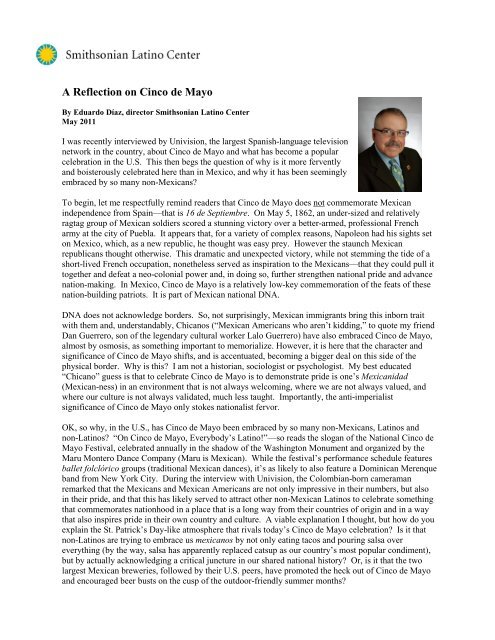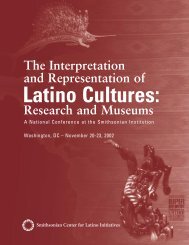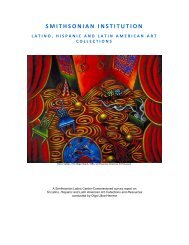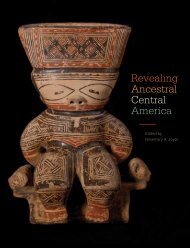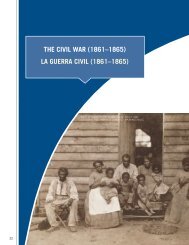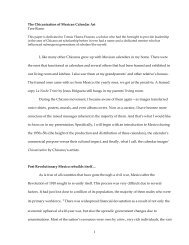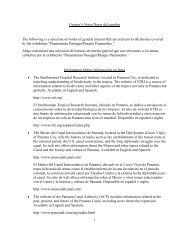A Reflection on Cinco de Mayo - Smithsonian Latino Center
A Reflection on Cinco de Mayo - Smithsonian Latino Center
A Reflection on Cinco de Mayo - Smithsonian Latino Center
You also want an ePaper? Increase the reach of your titles
YUMPU automatically turns print PDFs into web optimized ePapers that Google loves.
A <str<strong>on</strong>g>Reflecti<strong>on</strong></str<strong>on</strong>g> <strong>on</strong> <strong>Cinco</strong> <strong>de</strong> <strong>Mayo</strong><br />
By Eduardo Díaz, director Smiths<strong>on</strong>ian <strong>Latino</strong> <strong>Center</strong><br />
May 2011<br />
I was recently interviewed by Univisi<strong>on</strong>, the largest Spanish-language televisi<strong>on</strong><br />
network in the country, about <strong>Cinco</strong> <strong>de</strong> <strong>Mayo</strong> and what has become a popular<br />
celebrati<strong>on</strong> in the U.S. This then begs the questi<strong>on</strong> of why is it more fervently<br />
and boisterously celebrated here than in Mexico, and why it has been seemingly<br />
embraced by so many n<strong>on</strong>-Mexicans<br />
To begin, let me respectfully remind rea<strong>de</strong>rs that <strong>Cinco</strong> <strong>de</strong> <strong>Mayo</strong> does not commemorate Mexican<br />
in<strong>de</strong>pen<strong>de</strong>nce from Spain—that is 16 <strong>de</strong> Septiembre. On May 5, 1862, an un<strong>de</strong>r-sized and relatively<br />
ragtag group of Mexican soldiers scored a stunning victory over a better-armed, professi<strong>on</strong>al French<br />
army at the city of Puebla. It appears that, for a variety of complex reas<strong>on</strong>s, Napole<strong>on</strong> had his sights set<br />
<strong>on</strong> Mexico, which, as a new republic, he thought was easy prey. However the staunch Mexican<br />
republicans thought otherwise. This dramatic and unexpected victory, while not stemming the ti<strong>de</strong> of a<br />
short-lived French occupati<strong>on</strong>, n<strong>on</strong>etheless served as inspirati<strong>on</strong> to the Mexicans—that they could pull it<br />
together and <strong>de</strong>feat a neo-col<strong>on</strong>ial power and, in doing so, further strengthen nati<strong>on</strong>al pri<strong>de</strong> and advance<br />
nati<strong>on</strong>-making. In Mexico, <strong>Cinco</strong> <strong>de</strong> <strong>Mayo</strong> is a relatively low-key commemorati<strong>on</strong> of the feats of these<br />
nati<strong>on</strong>-building patriots. It is part of Mexican nati<strong>on</strong>al DNA.<br />
DNA does not acknowledge bor<strong>de</strong>rs. So, not surprisingly, Mexican immigrants bring this inborn trait<br />
with them and, un<strong>de</strong>rstandably, Chicanos (“Mexican Americans who aren’t kidding,” to quote my friend<br />
Dan Guerrero, s<strong>on</strong> of the legendary cultural worker Lalo Guerrero) have also embraced <strong>Cinco</strong> <strong>de</strong> <strong>Mayo</strong>,<br />
almost by osmosis, as something important to memorialize. However, it is here that the character and<br />
significance of <strong>Cinco</strong> <strong>de</strong> <strong>Mayo</strong> shifts, and is accentuated, becoming a bigger <strong>de</strong>al <strong>on</strong> this si<strong>de</strong> of the<br />
physical bor<strong>de</strong>r. Why is this I am not a historian, sociologist or psychologist. My best educated<br />
“Chicano” guess is that to celebrate <strong>Cinco</strong> <strong>de</strong> <strong>Mayo</strong> is to <strong>de</strong>m<strong>on</strong>strate pri<strong>de</strong> is <strong>on</strong>e’s Mexicanidad<br />
(Mexican-ness) in an envir<strong>on</strong>ment that is not always welcoming, where we are not always valued, and<br />
where our culture is not always validated, much less taught. Importantly, the anti-imperialist<br />
significance of <strong>Cinco</strong> <strong>de</strong> <strong>Mayo</strong> <strong>on</strong>ly stokes nati<strong>on</strong>alist fervor.<br />
OK, so why, in the U.S., has <strong>Cinco</strong> <strong>de</strong> <strong>Mayo</strong> been embraced by so many n<strong>on</strong>-Mexicans, <strong>Latino</strong>s and<br />
n<strong>on</strong>-<strong>Latino</strong>s “On <strong>Cinco</strong> <strong>de</strong> <strong>Mayo</strong>, Everybody’s <strong>Latino</strong>!”—so reads the slogan of the Nati<strong>on</strong>al <strong>Cinco</strong> <strong>de</strong><br />
<strong>Mayo</strong> Festival, celebrated annually in the shadow of the Washingt<strong>on</strong> M<strong>on</strong>ument and organized by the<br />
Maru M<strong>on</strong>tero Dance Company (Maru is Mexican). While the festival’s performance schedule features<br />
ballet folclórico groups (traditi<strong>on</strong>al Mexican dances), it’s as likely to also feature a Dominican Merenque<br />
band from New York City. During the interview with Univisi<strong>on</strong>, the Colombian-born cameraman<br />
remarked that the Mexicans and Mexican Americans are not <strong>on</strong>ly impressive in their numbers, but also<br />
in their pri<strong>de</strong>, and that this has likely served to attract other n<strong>on</strong>-Mexican <strong>Latino</strong>s to celebrate something<br />
that commemorates nati<strong>on</strong>hood in a place that is a l<strong>on</strong>g way from their countries of origin and in a way<br />
that also inspires pri<strong>de</strong> in their own country and culture. A viable explanati<strong>on</strong> I thought, but how do you<br />
explain the St. Patrick’s Day-like atmosphere that rivals today’s <strong>Cinco</strong> <strong>de</strong> <strong>Mayo</strong> celebrati<strong>on</strong> Is it that<br />
n<strong>on</strong>-<strong>Latino</strong>s are trying to embrace us mexicanos by not <strong>on</strong>ly eating tacos and pouring salsa over<br />
everything (by the way, salsa has apparently replaced catsup as our country’s most popular c<strong>on</strong>diment),<br />
but by actually acknowledging a critical juncture in our shared nati<strong>on</strong>al history Or, is it that the two<br />
largest Mexican breweries, followed by their U.S. peers, have promoted the heck out of <strong>Cinco</strong> <strong>de</strong> <strong>Mayo</strong><br />
and encouraged beer busts <strong>on</strong> the cusp of the outdoor-friendly summer m<strong>on</strong>ths
Hey, I enjoy my green beer every March 17 th and, h<strong>on</strong>estly, while doing so, I’m not necessarily<br />
c<strong>on</strong>templating how this revered saint led efforts to Christianize the polytheistic Irish natives in the fifth<br />
century. The point is, that while celebrating dates that make us feel good and that allow us to revel in<br />
our own particular or appropriated i<strong>de</strong>ntity, we might also want to pause and c<strong>on</strong>template the true<br />
significance of what we really celebrate—before we tip our glass.


